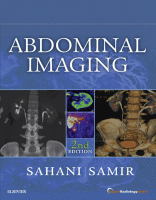Physical Address
304 North Cardinal St.
Dorchester Center, MA 02124

Etiology Biliary dilatation can occur as a result of biliary obstruction, from an altered functional state (e.g., after cholecystectomy or with sphincter of Oddi dysfunction), or uncommonly as a result of a choledochal cyst. The role of imaging is to…

General Considerations Diffuse involvement of the pancreas can occur with various inflammatory, infective, infiltrative, or neoplastic disorders. Any pathologic process that involves the pancreas focally also can cause diffuse involvement ( Box 51-1 ). More common causes of diffuse pancreatic…

Autoimmune Pancreatitis Etiology Autoimmune pancreatitis (AIP) is a peculiar form of chronic pancreatitis characterized by a fibroinflammatory process involving multiple organs with characteristic histopathologic and serologic features, association with other autoimmune disorders, and a propensity to respond to corticosteroid therapy…

Etiology Chronic pancreatitis is defined as an ongoing prolonged inflammatory disease characterized by progressive irreversible structural changes resulting in permanent loss of endocrine and exocrine function. The Cambridge classification of 1983 acknowledged that chronic pancreatitis is typically associated with abdominal…

Etiology Acute pancreatitis is an acute inflammatory disorder of the pancreas that has numerous causes ( Box 48-1 ). The most common risk factors are chronic alcohol consumption and choledocholithiasis. In 20% of cases no cause can be found. Box…

Etiology Cystic lesions of the pancreas encompass a wide spectrum of different pathologic entities, ranging from developmental, to inflammatory, to neoplastic cysts. Neoplastic cystic lesions, which are the most important, owing to their profound impact on patient prognosis and the…

Etiology The term solid pancreatic masses, in its wide meaning, encompasses neoplastic lesions and non-neoplastic masses, ranging from anatomic variants, such as pancreatic head lobulations, to focal inflammatory processes and neoplasms. This chapter will mainly discuss solid pancreatic neoplasms and…

Multidetector Computed Tomography Multidetector computed tomography (MDCT) has become a fundamental technique of pancreatic imaging. Today, higher image quality can be obtained in abdominal imaging, and this is even more significant in pancreatic imaging, in which the reduction of acquisition…

Technical Aspects Diagnostic imaging of the hepatobiliary system, with multidetector computed tomography (MDCT) and magnetic resonance imaging (MRI), plays a major role in hepatobiliary surgery, helping to choose the best therapeutic approach, reduce complications, and identify the anatomy requiring special…

Primary biliary cirrhosis (PBC) and primary sclerosing cholangitis (PSC) are the two most common and well-characterized primary cholestatic disorders. In contrast to pathologic processes derived primarily from hepatocellular dysfunction, such as viral hepatitis and autoimmune hepatitis, the primary insult in…